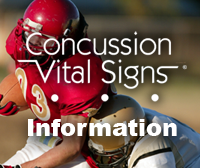
Overview
There are two types of Concussion Vital Signs reports depending on the test administered. One of course, is the Baseline report. The second is the Post Injury report.
Each report, both Baseline and Post Injury, raw scores for each tests as well as an indication as to whether the test was a valid effort (see below). In addition, where the athlete scores compared to age matched peers is described on the report.
The Post Injury report will report the Baseline scores along with current Post Injury scores as well as whether or not current Post-Injury scores for the athlete returned to baseline, or within 5% of baseline.
The Post Injury report will produce graphs of all scores to date such that you have a longitudinal view of the testing performance, for all testing to date. For clinicians, the report can be printed if needed as part of a patient chart and the PDF format typically can be uploaded to EMRs.
In addition, a Concussion Symptom Severity Scale and a Concussion History are reported when completed as part of the testing protocol.
Below you will find sample neurocognitive clinical reports including (1) a complete baseline report (2) neurocognitive baseline report (3) and a post-injury report; and the auto-scored results of a concussion symptom scale report and the results of the athlete-reported concussion history report.
Concussion Vital Signs Complete Baseline Report
Concussion Vital Signs Neurocognitive Baseline Report
Concussion Vital Signs Baseline Symptom Scale
Concussion Vital Signs Athlete Information & Medical History
Concussion Vital Signs Post-Injury Neurocognitive Test & Symptom Scale Report
Interpreting the baseline report
Check that all test domains are valid.
Test validity can be found in the column labeled VALID SCORE. If there is a "NO" listed for any of the domains, it is suggested the test be re-administered until the athlete scores valid scores on all domains.
Note that Concussion Vital Signs is a subset of the clinical battery CNS Vital Signs and as such may identify athletes with a cognitive deficit. Athletes with extremely low scores that cannot improve upon retest may need to see a qualified healthcare provider for a more comprehensive workup. Low scores will be described in the "Compared to Peers" column on the report.
There are three possible groups in the Compared to Peers column, Below Average, Average and Above Average. Athletes scoring Above Average are scoring greater than one standard deviation higher than their student peers. Athletes scoring Below Average are scoring less than one standard deviation than their student peers. Average score fall between Above Average and Below Average. About 2/3 of students peers will score Average.
Repeat baseline testing is encouraged if it is felt the athlete did not do their best or if the scores seem much lower than expected.
Interpreting the post injury report.
Concussion Vital Signs testing alone in not evidence for returning to play. Clinicians should perform a comprehensive exam as needed. It is important to understand and for clinicians to be aware that athletes who do not do their best on the baseline test may score higher on a post injury test and this can be a spurious result.
The athlete might be experiencing a deficit such that they are unable to register valid scores. This may be of clinical significance and if the athlete cannot score valid tests a referral to a qualified healthcare provider for a more comprehensive workup should be considered.
Check that the athlete has returned to “At Baseline or Better” and act accordingly per your concussion monitoring protocol. If an athlete is unable to return to baseline a referral to a qualified healthcare provider for a more comprehensive workup should be considered.
It is important to understand that the report displays a "Concussion Reference Code" allowing clinicians assisting with evaluations to access the Clinical Portal section of this site and test the athlete in the office at no cost. In those cases where testing is administered in clinician offices the report will be available for printing at the office as well as being archived in the school Concussion Vital Signs account.
Concussion Vital Signs is not a substitute for a neurological workup or comprehensive neurocognitive testing. Similarly, the Concussion Vital Signs testing is not exhaustive and performance within normal limits should not be taken as lack of evidence for cognitive disorders.
Copyright CNS Vital Signs, LLC. © 2003 - 2026 All rights reserved.
"Concussion Vital Signs" is a Trademark of CNS Vital Signs, LLC, All rights protected.
Use of Concussion Vital Signs Product and Website constitutes acceptance of the Concussion Vital Signs Terms of Use and the CNS Vital Signs Privacy Policy.

 Product Information
Product Information